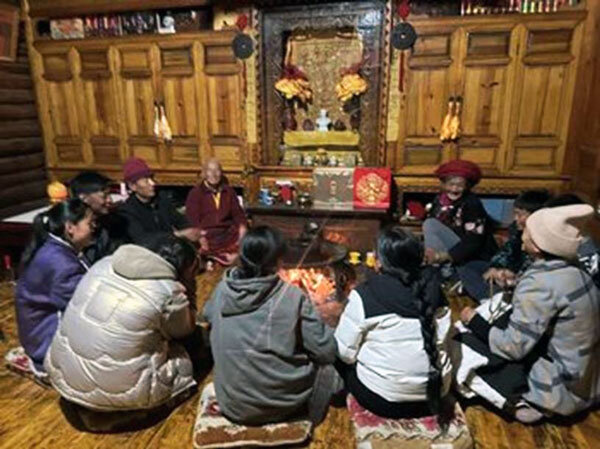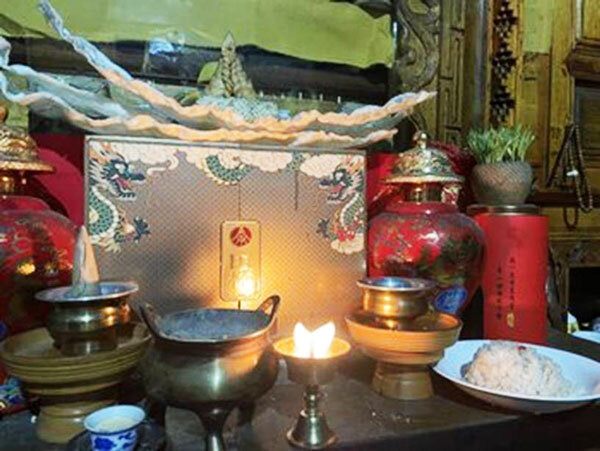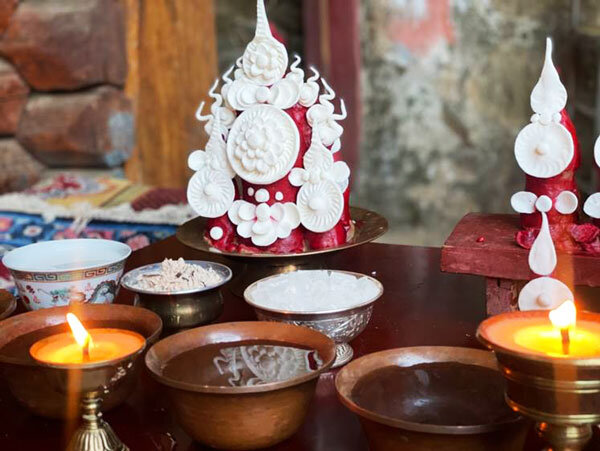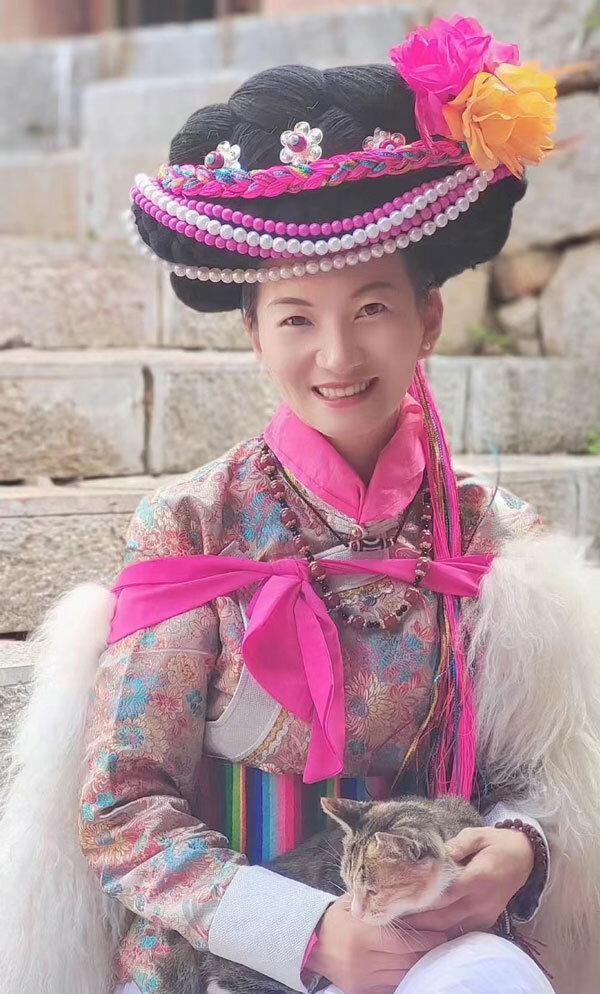1. Ceremony of Guo Zhuang worshipping
Guo Zhuang is an important component of the mother house. Every part of the mother house has its own function and significance. The fireplace in the mother house consists of a square area where the fire burns, and a tripod. The fire area is made of clay, and at the top of the fire area, there is a brick used as the heart of the fireplace, which also serves as a cushion for firewood. Mosuo people avoid using stones in the heart of the fireplace, in the belief that most stones are hard and are not good material for the heart. The heart of the fireplace should be soft, so that families can cultivate compassionate children. There is a tripod standing over the fireplace area, with a kettle for boiling water on it. It is a taboo to leave the kettle empty. Under the tripod, the firewood is burned. It is a taboo to add firewood from all directions of the tripod. Firewood must be added only from the same entrance under the tripod, which means that the family will prosper only when everybody strives in the same direction.

Above the fireplace is an altar, which usually enshrines the God of Fire, the God of Wealth, Buddhas, and portraits of great men. The lower rack of the altar is the Guo Zhuang stand, where offerings are placed to worship their ancestors three times a day, as well as gifts brought by guests. In addition, there are some storage cabinets which make up part of the Guo Zhuang stand. These structures together constitute the fireplace and the Guo Zhuang stand used to worship ancestors and gods. The Mosuo fireplace is built with both square and round structures, evoking a Chinese proverb "no squares and circles can be drawn without compasses or rulers—nothing can be achieved without norms or standards." The materials in the fireplace area are made up of five types of substances: gold, wood, water, fire, and soil, representing the formation and evolutionary relationship existing between all matters in the world. Every aspect of the Mosuo fireplace culture reflects their ancient philosophy. The mother house is the root of the Mosuo people, the fireplace is the heart of the mother house and Guo Zhuang is the most authoritative place in the mother house. In this way, the ritual of Guo Zhuang worshipping by the Mosuo people is imbued with sacred and inviolable significance. "Guo Zhuang worshipping" is translated as Chuo Duo in the Mosuo language, which means worshipping gods. The Mosuo people pay tribute to Guo Zhuang through their three daily meals, which is a way to worship their ancestors. After a bereavement and cremation, there is no separate cemetery or memorial tablet for the deceased. They believe that the soul never perishes and after death, it will return home in the form of a deity. Therefore, descendants worship their ancestors through the ritual of Guo Zhuang worshipping.

The Guo Zhuang worshipping ceremony is usually divided into two types. One is a daily ritual and the other is a wedding ceremony. The Guo Zhuang worshipping ritual in daily life is carried out by the descendants of the family through the three daily meals, also called Chuo Duo. In addition, gifts brought by guests or relatives and friends visiting during holidays are called Gua Lu Pa Ba. Gua Lu means Guo Zhuang, and Pa Ba means gifts, which, put together, mean "Guo Zhuang gift." The Mosuo language expression for the ceremony of Guo Zhuang worshipping for wedding purpose is called Chuo Duo Qi. Chuo Duo means Guo Zhuang gifts, and Qi means moving, which, put together, can be explained as "moving the Guo Zhuang gifts." In wedding customs, Chuo Duo Qi can be translated in layman's terms as "offering betrothal gifts to the bride's family." Only after consummating the Guo Zhuang worshipping ceremony can this marriage be recognized by the Mosuo people and both families. Therefore, in the life of the Mosuo people, the establishment of marital relationships first entails the Guo Zhuang worshipping ceremony, only after which the marriage will truly take effect and become "legitimate". This is also where the marriage customs of the Mosuo people differ from those of other ethnic groups.
2. Daily life
The day of the Mosuo people begins from their mother house. Usually, women living in the mother house wake up at five or six o'clock every morning. They first kindle the fire in the fireplace and then boil water in the teapot on the Guo Zhuang. They make some tea with an earthen tea pot and cook some dim sum. When the tea is ready, first they pay tribute to Guo Zhuang with tea and dim sum. Finally, they replace the pure water in front of the Buddha with tea, and light the butter lamp. After completing this ritual, the women go to the pagoda to worship the natural gods. This is how the day of the Mosuo people begins. After these routines are finished, the rest of the family also get up one after another. After the whole family have risen, the person who cooks must first offer the food to the Guo Zhuang before starting to try it themselves. When the meal is ready, the whole family sit at the fireplace and eat together. This is how Mosuo people have three daily meals, day after day, year after year.

In addition, guests often visit, who will not come empty-handed. As a rule, they visit with gifts which will be offered to the Guo Zhuang by the host. If guests make purposeful visits, then the gifts offered to the host family's Guo Zhuang become extremely important. If the host wishes to agree to the guest's needs, the host will tacitly allow him to offer it to the Guo Zhuang; if the host cannot meet the guest's needs, the gift will be returned to him. This situation typically involves the guest asking for a pig, an acre of land, a bag of rice, and so on. Mosuo people rarely fulfill agreements in their daily life through written contract, legal procedures, or formalities like that. It is believed that a mandatory contract is not in line with human nature. Therefore, they prefer to impose moral constraints through the ritual of Guo Zhuang worshipping.
Conventionally, the elders of the Mosuo people also attach great importance to the inheritance of the Mosuo fireplace culture by young people, whereby the Mosuo people are expected to cherish integrity, accountability and responsiveness.
3. Marital customs
The most common form of marriage among the Mosuo people is the "visiting marriage," the process of which involves dating between a man and a woman for a period of time. Once both sides have become interested in establishing a marital relationship, the man confides to the mother or the uncle of the woman his intention to propose to the woman, that is, to honor the Guo Zhuang. The elders of the Mosuo people usually do not intervene in the dating and the marriage of young people. As long as the young people are of an appropriate age to raise the request, the elders will typically agree. However, with love and marriage being considered as private matters, the bridegroom's family usually does not make a big deal of announcing the news to the public before deciding on an auspicious day to pay tribute to the bride's family's Guo Zhuang. Even after the ritual of paying respects to the Guo Zhuang, they will not take the liberty of spreading the good news. Outsiders refer to this custom as the "culture of shame" of the Mosuo people. Visiting marriage is a very private matter for Mosuo people, who usually do not take the initiative to make it public. The marital relationship will not take effect until the bridegroom's family consummates the Guo Zhuang worshipping ceremony.
The Mosuo visiting marriage usually begins after completing the Guo Zhuang worshipping ceremony, at which point the marriage has just been officially established. The marriage certificate does not play a very important role in the marital relationship of the Mosuo. Usually, given that no family has been established between the two parties, any children which result will live at the woman's home to be raised. The man only visits the woman at night, leaves early the next morning and returns to his own home. Therefore, this form of marriage is named "visiting marriage" by many scholars.*1([Perspectives of Traditional Culture of the Matrilineal Mosuo of Lugu Lake] Part 6: Mosuo Women's Choice of Marriage in Different Times). The major characteristic of this type of marriage is that the couple get married because of affection, sexual love, and the need to continue the maternal family's bloodline. Excluding the constraints imposed by money, social status, and other factors, this kind of marriage is more in line with human nature.*2
Based on my study, it is true that due to the lack of economic interests involved, the marital relationship between the couple is very stable, as long as there are no issues with their romantic relationship. Under the influence of the development of tourism, many people think of the Mosuo visiting marriage as men and women's total freedom in dating and romantic encounters. However, the visiting marriage in real life is witnessed by both families through the ritual of Guo Zhuang worshipping. Not legally binding as it is, it is still as sacred as law.
Entering the 21st century, the world has undergone drastic changes, and so has the Lugu Lake. The development of the tourist industry has greatly improved the local economy, leading to increasingly higher living standards. Young people's sense of ritual in love is strengthening, and is even influenced by foreign cultures. Despite being committed to the visiting marriage, they still want to hold weddings. However, the wedding does not replace the traditional ceremony of Guo Zhuang worshipping. Instead, Mosuo young people go to Tibet, Shangri-la, Dali, Lijiang, Sanya and other scenic places to take wedding photos after completing the ceremony of Guo Zhuang worshipping before choosing an auspicious day for the wedding. The wedding can be held at their own home or at a hotel with a banquet. There are usually two weddings, one hosted by the woman's family for young people, and the other by the man's family. This kind of wedding is not a traditional Mosuo wedding ceremony, nor is it a wedding ceremony based on the culture of another ethnic group. It is definitely a new type of wedding ceremony, a product of the encounter between traditional wedding culture and trends of modern wedding.
In short, in the life of the Mosuo people, although people seem to have a weak consciousness of the concept of law, their moral sanction goes beyond the scope of law. The rituals of non-mandatory constraints and spontaneous adherence to moral restraint are shining with the illumination of human civilization. The Mosuo ritual of Guo Zhuang worshipping is as respectful for gods as for the people themselves. Only by respecting oneself can one obtain corresponding freedom. In the eyes of the outsiders, the free life of the Mosuo people is built on their own self-restraint, which seems intangible, but is indeed truly tangible.
References
- *1: Visiting marriage: As the name suggests, the establishment of this marital relationship is based on "visiting," that is, a man and a woman fall in love and do not form a family. During the day, both parties live with their respective mothers' family, and at night, the man visits the woman's house for accommodation and leaves the next morning. Their marriage is maintained by the behavior of "visiting."
- *2: He Shao Quan, Chinese Mosuo people. Kunming: Yunnan People's Publishing House, 2017, 456.

Mosuo native, teacher with Lijiang College of Culture and Tourism, master in religion from Southwest Minzu University. Engaged in a number of social field research projects, such as the national language protection project Mosuo language rescue and protection, the project of National Social Science Fund " Cultural History of Disaster of Yunnan Indigenous Minority Groups", etc. Since 2011, following up with studies on Mosuo matrilineal culture (marriage, religion, etc.).Also engaged in related cultural researches and visiting scholars' projects.
- [Perspectives of Traditional Culture of the Matrilineal Mosuo of Lugu Lake] Part 2: First-Sight-Of-Sun Gifts for Mosuo Babies
- [Perspectives of Traditional Culture of the Matrilineal Mosuo of Lugu Lake] Part 3: Mosuo People's Parenting Period
- Learning to Live Together through Folktales: on Telling Tales from Southeast Asia and Korea
- [Perspectives of Traditional Culture of the Matrilineal Mosuo of Lugu Lake] Part 9: Chinese New Year
- [Perspectives of Traditional Culture of the Matrilineal Mosuo of Lugu Lake] Part 8: The Mosuo Festival of Worshipping the Goddess Gemu
- [Perspectives of Traditional Culture of the Matrilineal Mosuo of Lugu Lake] Part 7: Mosuo People's Ritual of "Guo Zhuang" Worshipping














